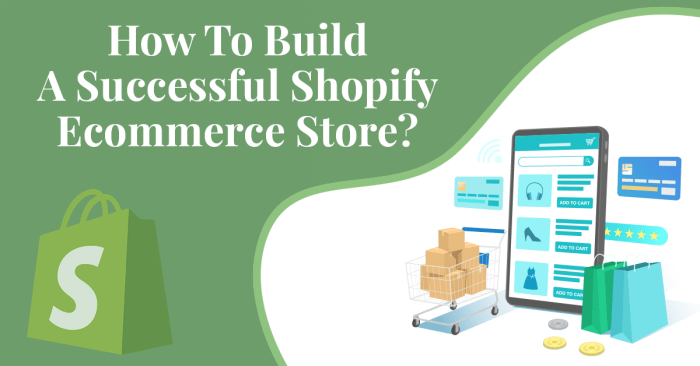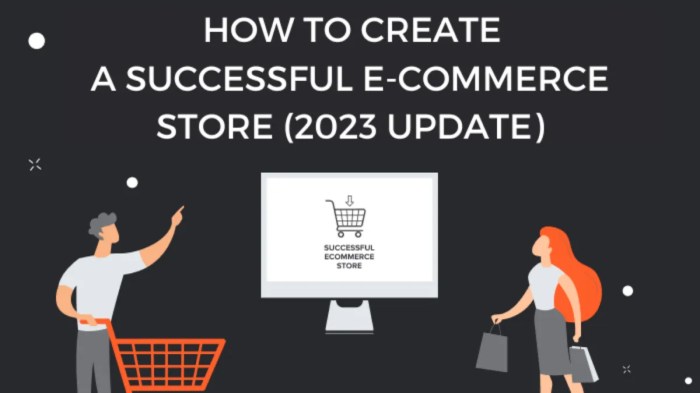Building a Successful E-commerce Store sets the stage for this enthralling narrative, offering readers a glimpse into a story that is rich in detail with american high school hip style and brimming with originality from the outset.
Get ready to dive into the world of E-commerce success with a guide that’s as fresh as your kicks and as cool as your favorite playlist.
Planning your E-commerce Store

When starting an E-commerce store, proper planning is crucial to ensure success. This involves conducting market research, selecting a profitable niche, and creating a solid business plan.
Market research is essential before setting up an online store as it helps you understand your target audience, competitors, and market trends. By gathering data on consumer preferences, purchasing behavior, and industry insights, you can make informed decisions to position your store effectively.
Successful Niche Selection Strategies
- Identify your passions and interests to find a niche you are knowledgeable about and passionate about.
- Conduct research to discover popular search terms and trends in different niches.
- Analyze competitors to determine gaps in the market or areas where you can differentiate your store.
- Consider target audience demographics and preferences to tailor your products or services to meet their needs.
Significance of a Business Plan in E-commerce
- A business plan Artikels your goals, target market, competition analysis, marketing strategies, and financial projections.
- It serves as a roadmap for your E-commerce store, helping you stay focused, make informed decisions, and track progress.
- A well-developed business plan is essential for securing funding, partnerships, and attracting potential investors or stakeholders.
- Regularly review and update your business plan to adapt to changing market conditions and ensure the long-term success of your E-commerce store.
Designing the Online Store
Creating a user-friendly E-commerce website is crucial for attracting and retaining customers. Here are key elements to consider:
Key Elements of a User-Friendly E-commerce Website
- Simple and Intuitive Navigation: Make it easy for customers to find what they are looking for with clear categories and search functionality.
- Mobile Responsiveness: Ensure your website is optimized for mobile devices to cater to the increasing number of mobile shoppers.
- High-Quality Images and Descriptions: Provide clear, high-resolution images and detailed product descriptions to help customers make informed purchasing decisions.
- Secure Payment Options: Offer a variety of secure payment options to build trust with customers and encourage conversions.
- Customer Reviews and Testimonials: Include customer reviews and testimonials to build credibility and trust with potential buyers.
Optimizing Product Pages for Better Conversions
- Clear Call-to-Action Buttons: Use prominent and compelling call-to-action buttons to guide customers towards making a purchase.
- Highlight Key Features and Benefits: Showcase the unique selling points of your products to entice customers and differentiate yourself from competitors.
- Implement User-Friendly Checkout Process: Streamline the checkout process with as few steps as possible to reduce cart abandonment rates.
- Utilize Upselling and Cross-Selling Techniques: Recommend related products or upgrades to increase the average order value.
The Role of Mobile Responsiveness in E-commerce Website Design
Mobile responsiveness is essential in E-commerce website design due to the increasing number of users shopping on mobile devices. A mobile-friendly website:
- Enhances User Experience: Ensures that customers can easily navigate and make purchases on smaller screens.
- Improves Ranking: Google prioritizes mobile-friendly websites in search results, leading to increased visibility and traffic.
- Boosts Conversions: Mobile-responsive websites have higher conversion rates as they cater to the needs of on-the-go shoppers.
Product Selection and Management

When building a successful e-commerce store, choosing the right products to sell online is crucial. Your product selection can make or break your business, so it’s essential to do thorough research and analysis before making decisions.
Choosing the Right Products to Sell Online
- Identify your target market: Understand who your customers are and what they are looking for.
- Conduct market research: Analyze trends, competition, and demand for different products in your niche.
- Consider profit margins: Choose products that offer a good balance between cost and potential profit.
- Test different products: Start with a small selection of products and expand based on customer feedback and sales data.
Effective Product Categorization and Organization
Organizing your products in a clear and logical manner is essential for a smooth shopping experience for your customers.
- Create distinct categories: Divide your products into relevant categories to make it easy for customers to navigate your store.
- Use filters and search functionality: Implement filters and search options to help customers quickly find what they are looking for.
- Optimize product descriptions: Write detailed and accurate descriptions to provide customers with all the necessary information.
Inventory Management Best Practices
Managing your inventory efficiently is crucial to avoid stockouts or overstock situations.
- Implement inventory tracking: Use software to track your inventory levels and set up alerts for low stock.
- Forecast demand: Analyze past sales data and trends to predict future demand and adjust your inventory accordingly.
- Set reorder points: Determine the minimum quantity of each product you need to have in stock and reorder before reaching that point.
Marketing Strategies for E-commerce
In the competitive world of E-commerce, having effective marketing strategies is crucial to stand out and attract customers to your online store. Here we will discuss the importance of , social media marketing, and email marketing in driving traffic and boosting sales.
Importance of in Driving Organic Traffic, Building a Successful E-commerce Store
, or Search Engine Optimization, plays a vital role in driving organic traffic to your online store. By optimizing your website content with relevant s, meta descriptions, and backlinks, you can improve your search engine rankings and visibility. This can result in increased organic traffic, higher click-through rates, and ultimately more conversions.
Role of Social Media Marketing
Social media marketing is essential for promoting E-commerce businesses and reaching a wider audience. By leveraging platforms like Facebook, Instagram, Twitter, and Pinterest, you can engage with potential customers, showcase your products, run targeted ads, and drive traffic to your online store. Building a strong social media presence can help boost brand awareness, increase customer loyalty, and drive sales.
Tips for Successful Email Marketing Campaigns
Email marketing remains a powerful tool for E-commerce businesses to connect with customers, nurture leads, and drive conversions. To run successful email marketing campaigns, it’s important to personalize your messages, segment your email list, create compelling subject lines, use eye-catching visuals, provide valuable content, and include clear call-to-action buttons. By sending targeted and engaging emails, you can build relationships with customers, drive repeat purchases, and increase revenue.
Payment Processing and Security: Building A Successful E-commerce Store
When it comes to running a successful e-commerce store, payment processing and security are crucial aspects to consider. Providing customers with a safe and convenient way to make transactions can help build trust and loyalty, ultimately leading to more sales for your business.
Payment Gateway Options
- PayPal: A widely used payment gateway that allows customers to pay using their PayPal account or credit/debit card.
- Stripe: Known for its easy integration and customizable options, Stripe supports various payment methods.
- Square: Offers a range of payment solutions, including in-person card readers and online payment processing.
Importance of SSL Certificates and Secure Checkout Processes
Having an SSL certificate for your e-commerce store is essential for encrypting sensitive data and providing a secure connection for online transactions. This helps protect customer information from potential cyber threats and builds credibility for your website.
Building Trust with Customers
- Display trust badges: Include recognizable trust badges from reputable security companies to reassure customers of secure transactions.
- Transparent policies: Clearly Artikel your refund, shipping, and privacy policies to instill confidence in customers when making purchases.
- Secure checkout process: Implement a multi-step checkout process with clear instructions and visual cues to guide customers through the payment process smoothly.